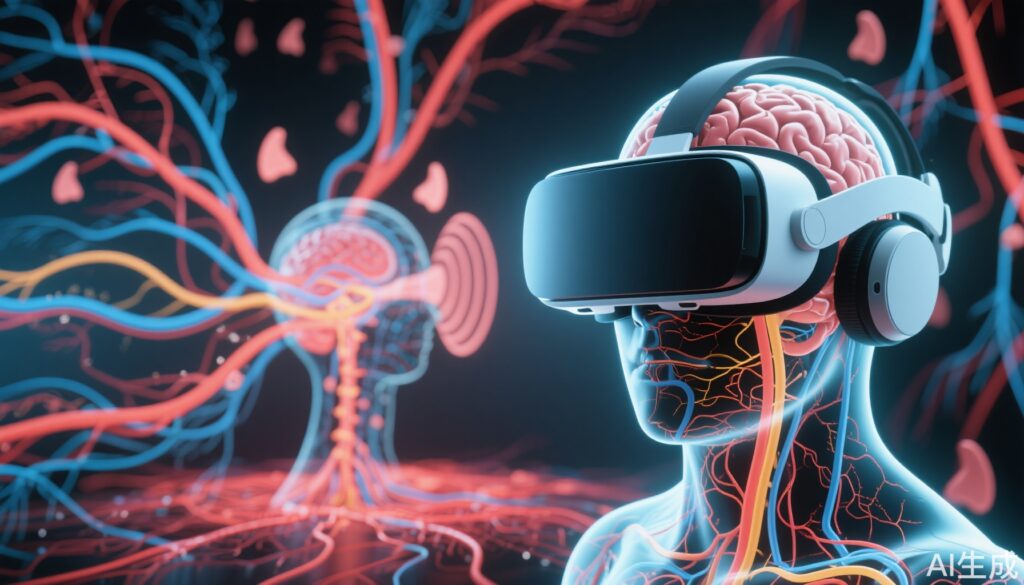Introduction
Auditory verbal hallucinations and persecutory delusions are core and disabling symptoms of schizophrenia spectrum disorders and psychosis. Despite pharmacological advances, many patients exhibit persistent symptoms resistant to standard treatments. Recently, immersive virtual reality (VR) has emerged as a novel therapeutic adjunct, aiming to modulate symptom severity through experiential cognitive and behavioral interventions. Two recent randomized controlled trials (RCTs) have explored VR-based therapies targeting these symptoms: the Challenge assessor-masked trial in Denmark evaluating immersive VR therapy for auditory verbal hallucinations, and the THRIVE trial in England comparing automated VR cognitive therapy with VR mental relaxation for persecutory delusions. This article compares these studies regarding methodology, outcomes, and clinical implications.
Clinical Background and Disease Burden
Persistent auditory verbal hallucinations affect a substantial proportion of patients with schizophrenia, often leading to distress and impaired functioning. Treatment-resistant hallucinations remain a significant clinical challenge, with limited effective interventions beyond pharmacotherapy. Similarly, persecutory delusions contribute to social withdrawal and disability in psychosis, with cognitive-behavioral therapy (CBT) being a frontline psychological treatment. Both symptom domains represent unmet needs where innovative, mechanism-targeted therapies are required.
Research Methodology
The Danish Challenge trial was a randomized, assessor-masked, parallel-group superiority trial recruiting 271 patients with schizophrenia spectrum disorders exhibiting persistent auditory verbal hallucinations refractory to antipsychotic medication. Participants were randomized 1:1 to receive either Challenge-VRT—seven weekly immersive VR sessions plus two booster sessions co-developed with voice-hearers—or enhanced treatment-as-usual matched in duration and frequency. The primary endpoint was auditory verbal hallucination severity assessed by the Psychotic Symptoms Rating Scales-Auditory Hallucinations (PSYRATS-AH) at 12 weeks.
The THRIVE trial was a parallel-group, single-blind RCT enrolling 80 patients with psychosis and persistent persecutory delusions held with at least 50% conviction. Patients were randomized 1:1 to automated VR cognitive therapy or VR mental relaxation therapy, each delivered in four sessions over approximately four weeks, alongside usual care. The primary outcome was delusion conviction measured by PSYRATS at end of treatment (4 weeks), with follow-ups extending to 24 weeks. Both trials used intention-to-treat analyses and blinded outcome assessment.
Key Findings
Challenge-VRT significantly reduced auditory verbal hallucination severity compared to enhanced treatment-as-usual at 12 weeks (adjusted mean difference -2.26, 95% CI -4.26 to -0.25, p=0.027), with a small effect size (Cohen’s d=0.27). Secondary analyses demonstrated sustained reduction in hallucination frequency at 12 and 24 weeks. Other secondary outcomes including distress and social performance were not significantly different. The intervention was generally well tolerated, though six serious adverse events possibly related to the intervention occurred.
In contrast, the THRIVE trial found no significant difference between VR cognitive therapy and VR mental relaxation in reducing persecutory delusion conviction at 4 weeks (adjusted mean difference -2.16, 95% CI -12.77 to 8.44, p=0.69). Mechanistic targets such as defense behaviors and safety beliefs were also unaffected. Both interventions had high attendance and similar treatment credibility and expectancy ratings. Serious adverse events were unrelated to the interventions.
Mechanistic Insights and Biological Plausibility
The Challenge-VRT’s co-development with lived experience may have enhanced engagement and allowed tailored exposure to dominant voices, potentially modulating neural circuits involved in auditory processing and emotional regulation. The modest effect size suggests partial symptom modulation rather than full remission.
THRIVE’s automated cognitive VR therapy targeted persecutory delusions by addressing maladaptive beliefs and behaviors through graded exposure and cognitive restructuring. The lack of superiority over relaxation suggests either insufficient dosing, inadequate modulation of underlying cognitive processes, or a need for adjunctive strategies.
Expert Commentary
These trials highlight the promise and challenges of VR therapies in psychosis. The positive findings in auditory hallucinations support further development of immersive, personalized VR approaches. The null results in persecutory delusions indicate that VR cognitive therapy, as implemented, may require refinement or combination with other modalities. Clinicians should consider VR therapy as an adjunct rather than standalone treatment.
Controversies and Limitations
The Challenge trial’s effect size, though statistically significant, was small, and generalizability is limited by lack of ethnic diversity data and regional confinement to Denmark. The THRIVE trial’s smaller sample size and the impact of COVID-19-related recruitment pauses may have limited power. Differences in therapy duration, session numbers, and symptom targets complicate direct comparisons.
Conclusion
Immersive VR-assisted therapy demonstrates short-term efficacy in reducing persistent auditory verbal hallucinations in schizophrenia, offering a novel adjunct for treatment-resistant symptoms. Conversely, automated VR cognitive therapy for persecutory delusions did not outperform VR relaxation, indicating the need for further research to optimize VR interventions for delusional symptoms. These findings collectively underscore the potential of VR as a transformative, yet still emerging, tool in psychosis treatment.
References
Smith LC et al. Immersive virtual reality-assisted therapy targeting persistent auditory verbal hallucinations in patients diagnosed with schizophrenia spectrum disorders in Denmark: the Challenge assessor-masked, randomised clinical trial. Lancet Psychiatry. 2025;12(8):557-567. doi:10.1016/S2215-0366(25)00161-0.
Freeman D et al. Automated virtual reality cognitive therapy versus virtual reality mental relaxation therapy for the treatment of persistent persecutory delusions in patients with psychosis (THRIVE): a parallel-group, single-blind, randomised controlled trial in England with mediation analyses. Lancet Psychiatry. 2023;10(11):836-847. doi:10.1016/S2215-0366(23)00257-2.



